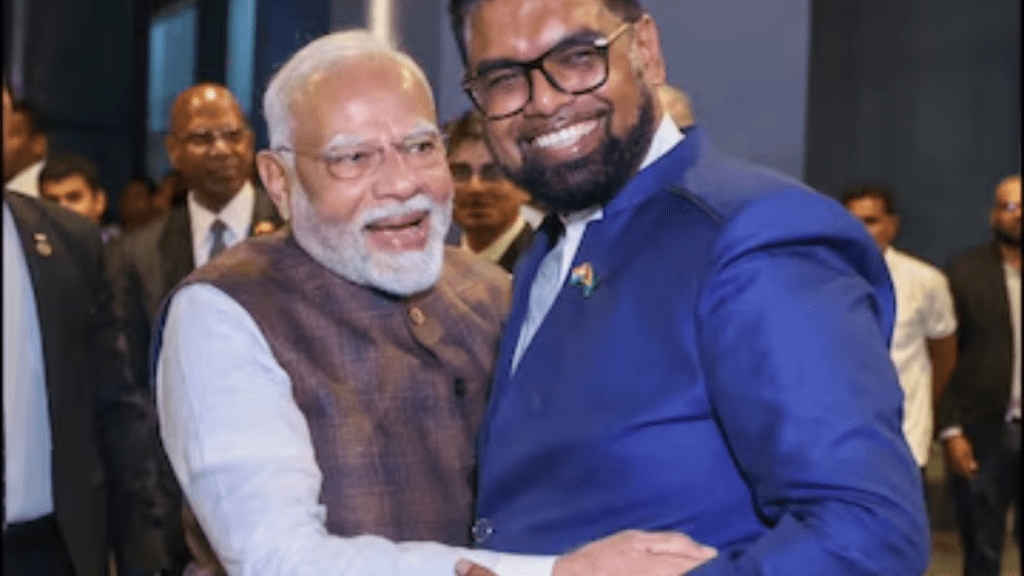India’s growing relationship with the Caribbean Community (CARICOM) nations has reached new heights, marked by Prime Minister Narendra Modi’s historic visit to Guyana and the profound connections forged with countries like Barbados. This visit, the first of its kind in 56 years, not only reinforced India’s commitment to the region but also showcased the unique and diverse ways in which India and CARICOM countries are working together on a wide range of fronts, from technology to humanitarian aid.
A Historic Visit to Guyana: Symbolic Gestures and Strong Ties
Prime Minister Modi’s state visit to Guyana was nothing short of historic. His arrival after 56 years was met with a level of warmth and respect that defied traditional diplomatic protocols. President Mohamed Irfaan Ali greeted Modi at midnight, a departure from official norms, underscoring the significance of the occasion. On his arrival Modi was welcomed by President Ali and his Cabinet Ministers at the airport and at the hotel, further emphasizing the country’s eagerness to solidify its ties with India.
One of the most memorable moments of the visit was when the Mayor of Georgetown presented Modi with the Key to the City—a rare honor signifying the special relationship between the two nations. Guyana also awarded Modi its highest civilian honor, symbolizing the deep mutual respect that now characterizes the India-Guyana partnership. Additionally, Modi and President Ali engaged in symbolic acts of friendship, such as planting a Bel Patra tree at the Indian Arrival Monument, which commemorates the historical links between India and the Caribbean.
Expanding Cooperation: Agriculture, Defence, and Digital Innovation
The visit was not just ceremonial—it was a milestone in expanding bilateral cooperation. One of the significant areas of collaboration was agriculture, where India pledged to assist Guyana in expanding its millet cultivation. This initiative aligns with India’s broader agricultural expertise and addresses Guyana’s need for sustainable food security. The two countries also signed 10 Memoranda of Understanding (MOUs), covering areas such as hydrocarbons, defense, and digital payment systems like the Unified Payments Interface (UPI), a revolutionary innovation that is transforming payment systems worldwide.
Prime Minister Modi also underscored India’s commitment to the region’s security by offering support in hydrography and maritime domain mapping, alongside a proposal for a passenger and cargo ferry to strengthen connectivity within the Caribbean. These initiatives aim to build a robust infrastructure for trade, security, and sustainable development across the region.
Deepening Humanitarian and Cultural Ties
The visit also highlighted the close cultural and humanitarian ties between India and Guyana. Modi participated in a traditional “Seven Curry” meal with Guyanese leaders, celebrating the shared culinary heritage between India and the Caribbean. Additionally, the planting of trees, such as the Bel Patra at the Indian Arrival Monument, reinforced the symbolic and tangible presence of Indian culture in Guyana.
India’s contribution to the region extends beyond diplomacy into critical areas of healthcare and social welfare. The PM’s speech at the CARICOM summit touched hearts, especially when he spoke of India’s role in providing life-saving vaccines during the COVID-19 pandemic. Several CARICOM leaders, including Prime Minister Mia Mottley of Barbados, became emotional as they recalled the invaluable assistance India provided during the global health crisis.
India’s commitment to long-term development was further demonstrated by offering scholarships and training programs. This includes the training of 11 women cricketers from CARICOM nations, strengthening sports diplomacy, and 1,000 ITEC (Indian Technical and Economic Cooperation) slots for capacity building. Additionally, India’s healthcare contributions continue to grow with the introduction of programs like Jan Aushadhi Kendras, mobile health units like the BHISHM hospital, and initiatives addressing chronic health concerns like dialysis and cancer treatment.
Barbados and Dominica: Highlighting Regional Support
Barbados, under the leadership of Prime Minister Mia Mottley, has emerged as a close ally in India’s broader Caribbean strategy. During the CARICOM Summit, the Prime Minister of Barbados praised Modi for his leadership and expressed deep gratitude for India’s vaccine diplomacy. Mottley’s emotional response to India’s assistance symbolized the enduring bond between the nations, built on mutual trust and respect.
Dominica also took steps to acknowledge India’s contribution by awarding Prime Minister Modi the highest honor in a ceremonial event attended by the President herself. These gestures are a clear indication of the Caribbean’s appreciation for India’s sustained support in both humanitarian and developmental sectors.
New Horizons: India’s Role in Regional Development
India’s involvement in the Caribbean is not just about aid—it’s about sustainable development and shared growth. For instance, India is assisting CARICOM countries with environmental challenges such as the invasive Sargassum seaweed, which disrupts local tourism and marine ecosystems. India’s expertise in converting this seaweed into fertilizer has the potential to alleviate a major environmental issue while providing agricultural benefits.
Additionally, India’s medical and technical assistance, including dialysis units, Jaipur Foot camps, and cancer therapy machines, has directly impacted the health infrastructure of CARICOM countries. These efforts are part of India’s broader mission to contribute to the health and well-being of people in the Global South, cementing its role as a trusted partner in development.
A Shared Vision for the Future
The CARICOM Summit showcased the growing role of India in shaping the future of the Global South. Prime Minister Modi’s seven-point plan for enhanced regional cooperation, which includes improving healthcare, education, infrastructure, and climate resilience, was well received by leaders across the region. This plan is a clear signal that India views its partnership with CARICOM nations as one built on shared aspirations and a vision for mutual progress.
As the India-CARICOM relationship continues to grow, it becomes increasingly clear that the Caribbean sees India not only as a partner in development but as a friend that offers both tangible support and emotional solidarity in times of need. With initiatives spanning agriculture, healthcare, education, and disaster relief, India’s growing influence in the region marks the beginning of a stronger, more interconnected future for both India and the Caribbean.

